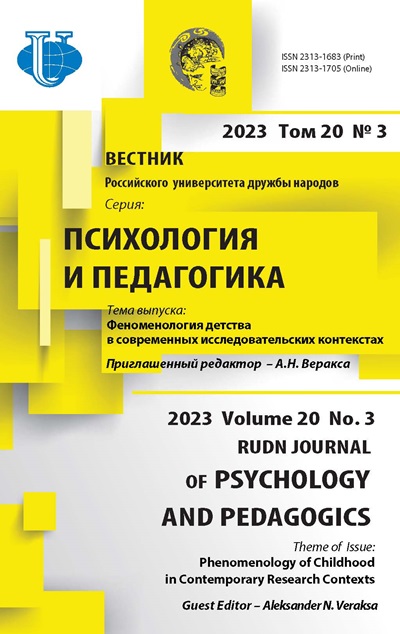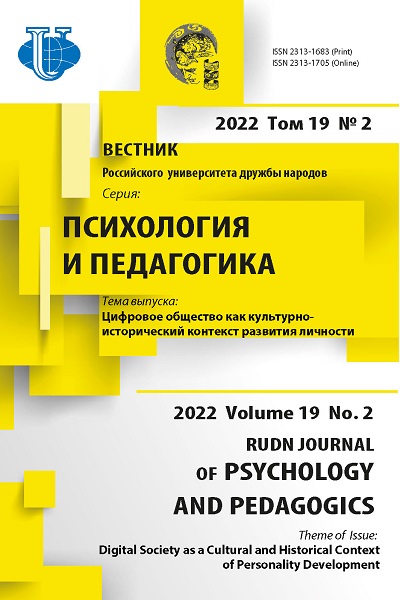Features of Students’ Experiences in Gaming Activity (Based on Group Board Games)
- Authors: Mitina O.V.1, Isakova R.V.2
-
Affiliations:
- Lomonosov Moscow State University
- Lomonosov Moscow State University, branch in Tashkent
- Issue: Vol 19, No 2 (2022): Digital Society as a Cultural and Historical Context of Personality Development
- Pages: 282-303
- Section: PERSONALITY IN THE DIGITAL AGE: DEVELOPMENT, COGNITION, COMMUNICATION
- URL: https://journals.rudn.ru/psychology-pedagogics/article/view/31392
- DOI: https://doi.org/10.22363/2313-1683-2022-19-2-282-303
Cite item
Full Text
Abstract
The problems of the game have long been relevant for many researchers and are considered from the perspective of various disciplines. In the modern era of digitalization, computer games have become widespread; they attract the attention and interest of both users and researchers. At the same time, “ordinary” board games in modern psychology are studied much less frequently and, mainly, on the example of chess. The purpose of this study is to identify changes in emotional states during and as a result of two board games that involve cooperative and competitive actions ( Imaginarium and Monopoly respectively) as well as to describe the nature of experiences of students in gaming activities, in particular, taking into account their personal characteristics. The study involved 62 students of higher educational institutions in Tashkent (Uzbekistan). To diagnose the emotional state of the respondents, we used the Method for Measuring Emotional Experience in Activity by D.A. Leontiev, and the Russian-language version of the Implicit Positive and Negative Affect Test (IPANAT) by O.V. Mitina et al. To measure personality traits, we used the Russian versions of the six-factor HEXACO-PI-R personality questionnaire by M.S. Egorova et al. and of the Dark Triad personality trait diagnostic technique by T.V. Kornilova et al. The results of the study, in general, demonstrate positive changes in the emotional state after gaming, regardless of the result and process. Both board games, in spite of their specificity, well increased the positive emotional background of the respondents. At the same time, it was found that the nature of the experience is related to the content of the gaming activity: the respondents more often experienced meaningfulness in the cooperative game Imaginarium and emptiness in the competitive game Monopoly .
Keywords
About the authors
Olga V. Mitina
Lomonosov Moscow State University
Email: omitina@inbox.ru
ORCID iD: 0000-0002-2237-4404
Ph.D. in Psychology, Associate Professor, is Leading Scientific Fellow, Department of Psychology
11 Mokhovaya St, bldg 9, Moscow, 125009, Russian FederationRina V. Isakova
Lomonosov Moscow State University, branch in Tashkent
Author for correspondence.
Email: rinapina.isakova@gmail.com
ORCID iD: 0000-0002-7823-2456
BA in Psychology, graduated from Department of Psychology
22 Amir Temur Shoh Ko’chasi, Tashkent, 100060, Republic of UzbekistanReferences
- Amini, K., Amini, A.E., Yaghoubi, M., & Amini, D. (2008). High school students playing computer games. Developmental Psychology (Journal of Iranian Psychologists), 4(14), 189–198.
- Bányai, F., Griffiths, M.D., Király, O., & Demetrovics, Z. (2019). The psychology of esports: A systematic literature review. Journal of Gambling Studies, 35(2), 351–365. https://doi.org/10.1007/s10899-018-9763-1
- Bartle, R.A. (1996). Hearts, clubs, diamonds, spades: Players who suit MUDs. Journal of MUD Research, 1(1), 19.
- Billieux, J., Van der Linden, M., Achab, S., Khazaal, Y., Paraskevopoulos, L., Zullino, D., & Thorens, G. (2013). Why do you play World of Warcraft? An in-depth exploration of self-reported motivations to play online and in-game behaviours in the virtual world of Azeroth. Computers in Human Behavior, 29(1), 103–109. https://doi.org/10.1016/j.chb.2012.07.021
- Boyle, E., Connolly, T. M., & Hainey, T. (2011). The role of psychology in understanding the impact of computer games. Entertainment Computing, 2(2), 69–74. https://doi.org/10.1016/j.entcom.2010.12.002
- Caillois, R. (2007). Les jeux et les hommes: Essai de sociologie de la culture. Moscow: OGI Publ. (In Russ.)
- Cole, M., & Cole, S.R. (2001). The development of children. 4th ed. New York: Worth Publishers.
- Csikszentmihalyi, M. (2000). Beyond boredom and anxiety: Experiencing flow in work and play (pp. 36–37). San Francisco: Jossey-Bass.
- Csikszentmihalyi, M. (2014). Flow. The psychology of optimal experience. Moscow: Smysl Publ., Al'pina Non-Fikshn Publ. (In Russ.)
- Culin, S. (1975). Games of the North American Indian. Mineola, New York: Dover Publications Inc.
- Egorova, M.S., Parshikova, O.V., & Mitina, O.V. (2019). Structure of the Russian variant of a Six-factor Hexaco Personality Inventory. Voprosy Psychologii, (5), 33–48. (In Russ.)
- Faulkner, G., Irving, H., Adlaf, E.M., & Turner, N. (2015). Subtypes of adolescent video gamers: A latent class analysis. International Journal of Mental Health and Addiction, 13(1), 1–18. https://doi.org/10.1007/s11469-014-9501-6
- Gobet, F., Retschitzki, J., & Voogt, A. (2004). Moves in mind: The psychology of board games. London: Psychology Press. https://doi.org/10.4324/9780203503638
- Gromova, D.A. (2016). Board games as a modern tool for a psychologist accompanied by teenagers. Contemporary Psychology: Conference Proceedings (pp. 16–19). Kazan: Buk Publ. (In Russ.)
- Hamari, J., & Tuunanen, J. (2014). Player types: A meta-synthesis. Transactions of the Digital Games Research Association, 1(2), 29–53. http://dx.doi.org/10.26503/todigra.v1i2.13
- Huizinga, J. (2011). Homo ludens. The person playing. Experience in determining the game element of culture. Saint Petersburg: Ivana Limbakha Publ. (In Russ.)
- Hyötyniemi, H., & Saariluoma, P. (1998). Simulating chess players’ recall: How many chunks and what kind can they be? In F.E. Ritter & R.M. Young (Eds.), Proceedings of the Second European Conference on Cognitive Modelling (pp. 195–196). Thrumpton: Nottingham University Press.
- Klein, K.G., Leontiev, D.A., Kostenko, V.Yu., Osin, E.N., Taranenko, O.A., & Kosheleva, N.V. (2019). Experiences in different activities: Temporal dynamics and construct validity. Psychological Science and Education, 24(5), 47–57. (In Russ.) https://doi.org/10.17759/pse.2019240505
- Kornilova, T.V., Kornilov, S.A., Chumakova, M.A., & Talmach, M.S. (2015). The Dark Triad Personality Traits Measure: Approbation of the dirty dozen questionnaire. Psikhologicheskii Zhurnal, 36(2), 99–112. (In Russ.)
- Kowert, R., & Ferguson, C. (2021). The psychology of digital games. In L. Migliore, C. McGee & M.N. Moore (Eds.), Handbook of Esports Medicine (pp. 187–199). Cham: Springer. https://doi.org/10.1007/978-3-030-73610-1_7
- Leontev, A.N. (2005). Deyatel'nost'. Soznanie. Lichnost'. Moscow: Smysl Publ. (In Russ.)
- Leontiev, D.A. (2015). Experiences accompanying activity and their diagnosis. Contemporary Psychodiagnostics in Russia: Overcoming the Crisis: Conference Proceedings (vol. 1, pp. 175–179). Chelyabinsk: SUSU Publ. (In Russ.)
- Leontiev, D.A., Osin, E.N., Dosumova, S.Sh., Rzaeva, F.R., & Bobrov, V.V. (2018). Study-related experiences and their association with psychological well-being. Psychological Science and Education, 23(6), 55–66. (In Russ.) https://doi.org/10.17759/pse.2018230605
- Lories, G. (1992). Using a neural network to preprocess chess positions. International Journal of Psychology, 27(3–4), 154.
- Manero, B., Torrente, J., Freire, M., & Fernández-Manjón, B. (2016). An instrument to build a gamer clustering framework according to gaming preferences and habits. Computers in Human Behavior, 62, 353–363. https://doi.org/10.1016/j.chb.2016.03.085
- Maslow, A. (1974). Cognition of being in the peak experiences. In T.M. Covin (Ed.), Readings in Human Development: A Humanistic Approach (pp. 83–106). New York: MSS Information Corp.
- Mayer, R.E. (2019). Computer games in education. Annual Review of Psychology, 70, 531–549. https://doi.org/10.1146/annurev-psych-010418-102744
- Mireles, D.E., & Charness, N. (2002). Computational explorations of the influence of structured knowledge on age-related cognitive decline. Psychology and Aging, 17(2), 245–259. https://doi.org/10.1037/0882-7974.17.2.245
- Mitina, O., Mozharovsky, I., Mirsaidov, M., & Bondarenko, A. (2020). Activity-related experiences and their dependence on the type of activity (profession, leisure, education). Organizational Psychology, 10(1), 29–44. (In Russ.)
- Mitina, O.V. (2015). Cronbach’s alpha: When and why to count it. Contemporary Psychodiagnostics in Russia: Overcoming the Crisis: Conference Proceedings (vol. 1, pp. 232–240). Chelyabinsk: SUSU Publ. (In Russ.)
- Mitina, O.V., & Mirsaidov, M.M. (2016). What computer games do people play: The influence of personality traits on preferences in choosing a game. Digital Society as a Cultural and Historical Context of Human Development: Conference Proceedings (pp. 270–275). Kolomna: State University of Humanities and Social Studies. (In Russ.)
- Mitina, O.V., Padun, M.A., & Zelyanina, A.N. (2017). Development of Russian version of implicit positive and negative affect test. Psikhologicheskii Zhurnal, 38(2), 104–121. (In Russ.)
- Parlett, D. (1999). The Oxford history of board games. Oxford, New York: Oxford University Press.
- Poddubny, S.E., Egamberdieva, E.V., & Babarykin, S.D. (2017). Personality characteristics of the players and those not playing chess. Nauchnyi Al'manakh, (9–2), 64–73. (In Russ.) https://doi.org/10.17117/na.2017.09.02.064
- Robert, M.A., & Tilman, F. (1988). Psychology of the individual and the group. Moscow: Progress Publ. (In Russ.)
- Rubinshtein, S.L. (1998). Osnovy obshchei psikhologii. Saint Petersburg: Piter Publ. (In Russ.)
- Vicente, K.J., & Wang, J.H. (1998). An ecological theory of expertise effects in memory recall. Psychological Review, 105(1), 33–57. https://doi.org/10.1037/0033-295X.105.1.33
- Voiskounsky, A.E., & Avetisova, A.A. (2009). Traditional and contemporary research on play behavior. Methodology and History of Psychology, 4(4), 82–94. (In Russ.)
- Voiskunsky, A.E., & Smyslova, O.V. (2003). The role of the motivation of “the flow”" in the development of hacker competence. Voprosy Psychologii, (4), 35–43. (In Russ.)
















